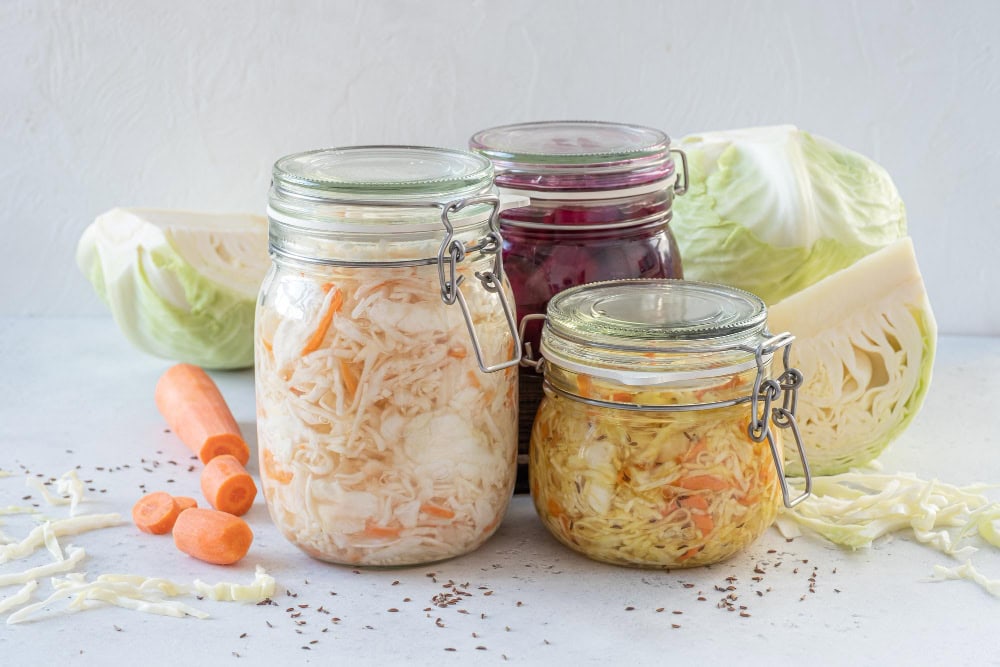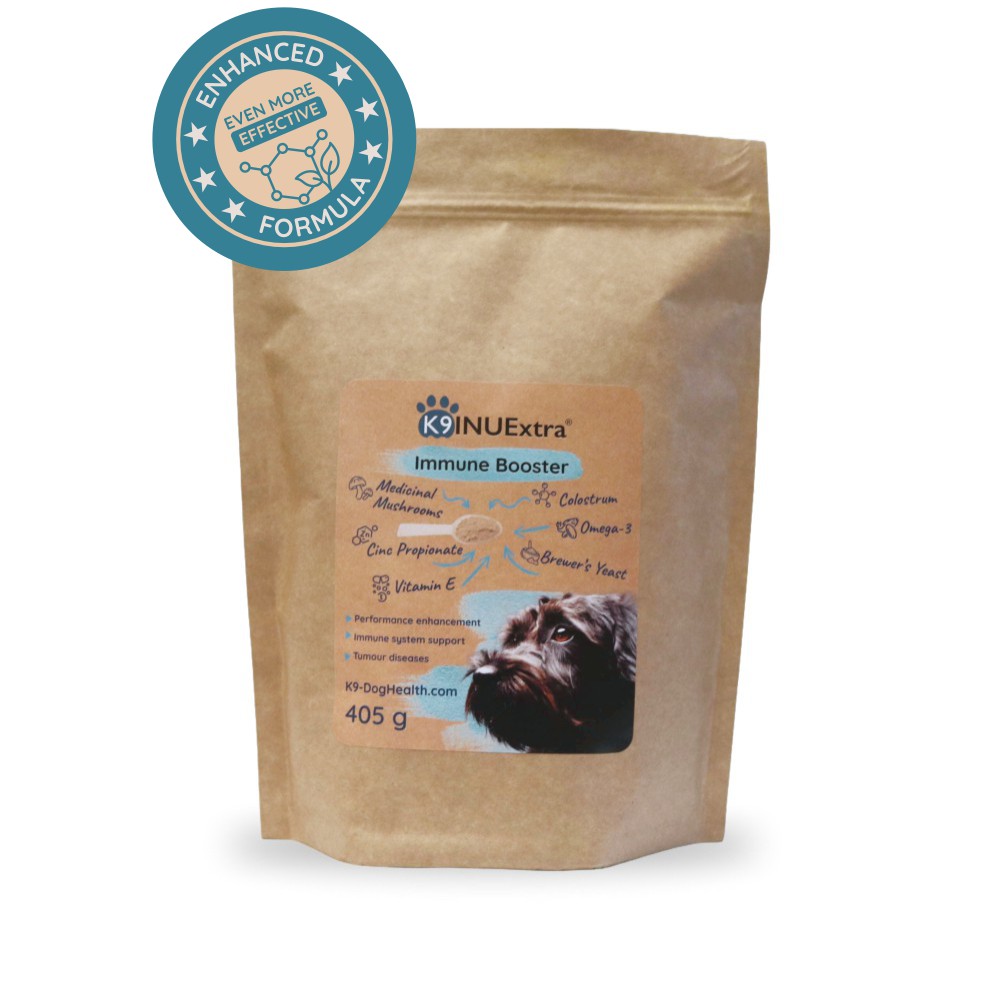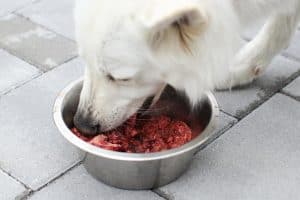Probiotics for dogs – The benefits of fermented vegetables
Probiotics for dogs and nutrition go hand in hand when it comes to maintaining overall health. Just like in humans, a strong immune system in dogs starts with a healthy gut. According to Dr. Karen Shaw Becker, who extensively discusses this topic in her book (The Forever Dog) and videos, fermented vegetables, also known as lacto-fermented vegetables, provide a natural source of probiotics that support toxin elimination. The gut microbiome plays a crucial role in immune function, as beneficial bacteria aid digestion, enhance nutrient absorption, and protect against pathogens. If this delicate balance is disrupted – due to antibiotic treatments, stress, or improper diet – it can weaken the immune system and cause digestive issues.
Why are probiotics essential for dogs?
A dog’s digestive system is primarily designed to process animal-based foods. However, it can also adapt to digest certain carbohydrates when introduced gradually. In fact, a balanced gut flora not only supports the immune system but also plays a key role in energy production and efficient nutrient absorption. Therefore, choosing the right probiotic for dogs is essential. The best options often contain strains of Lactobacillus and Bifidobacterium, which help maintain the balance of beneficial bacteria. As a result, they promote better digestion, a stronger immune system, and overall vitality.
The benefits of fermented vegetables

What fermented vegetables should we give to dogs?
Dogs generally tolerate low-starch fermented vegetables well, such as zucchini, cabbage, kohlrabi, and cucumber. Higher-starch vegetables like carrots or beets can also be fermented, but they should be introduced gradually. The juice from fermented vegetables is also beneficial, as it contains concentrated probiotics and other essential nutrients.
How to make probiotic-rich fermented vegetables for dogs
Choosing the right vegetables
Only ferment vegetables that are safe for dogs to eat raw. While fruits can also be fermented, vegetables are a healthier and more convenient choice for canine consumption.
For beginners, start with low-starch vegetables like cucumbers, zucchini, Jerusalem artichokes, kohlrabi, squash, or cabbage. More experienced fermenters can try carrots, parsley root, sweet potatoes, pumpkin, or beets – though these require more careful preparation.
Selecting the right water and salt
Use purified, non-carbonated mineral water or boiled and cooled tap water. For salt, choose non-iodized natural varieties, such as Himalayan salt, alpine salt, or rock salt, which are rich in minerals.
Tools and preparation for dog probiotic making
You’ll need a well-sealed glass jar, a cutting board, a sharp knife, a slicer, or a grater. Ensure all equipment is thoroughly cleaned, ideally by scalding.
-


K9 INUExtra®
- Premium immune support with medicinal mushrooms and colostrum
- Anti-inflammatory support with curcumin, omega-3 and BioPerine
- Stronger gut flora and improved digestion with brewer’s yeast and targeted prebiotics
- Antioxidant cellular protection with vitamin E, zinc and natural active compounds
€64,93 (ex.VAT)
Step-by-step guide to fermenting vegetables for dogs
- Prepare the vegetables – First, wash them thoroughly to remove any dirt or residue. Then chop them to the desired size, and mix them carefully with your chosen herbs or natural additives.
- Prepare the brine – Next, for every liter of room-temperature purified water, add one level tablespoon of salt (20 grams). Stir well until it is completely dissolved, thereby creating a 2% saline solution that supports healthy fermentation.
- Ferment the vegetables – After that, fill the jar with the chopped vegetables, making sure to leave enough space for the brine. Then pour the brine over the vegetables until they are fully submerged, ensuring that no air pockets remain.
- Allow fermentation – Once sealed, store the jar in a stable, dark environment at 20–22°C (68–72°F). Importantly, check it daily and gently loosen the lid to release built-up gases, as this prevents pressure and ensures safe fermentation.
- Storage – Finally, remember that fermentation time varies between 3–10 days, depending on the type of vegetable. Once the desired flavor and texture develop, refrigerate the jar to slow the process. For optimal probiotic benefits, it is best to wait another 2–3 weeks before feeding, so the beneficial bacteria can fully mature.
Recommended serving size for dogs
Introduce fermented vegetables gradually. Start by adding a few drops of the juice to the dog’s food, then increase the amount slowly. Eventually, replace part of the usual vegetable portion with fermented alternatives.
How to enhance fermented vegetables for better health
Boost the nutritional value by adding safe herbs and supplements like dill, garlic, parsley, nettle, peppermint, turmeric, beet powder, or spirulina. Dogs with kidney issues or on specialized diets should receive lower salt concentrations—or ferment without salt while ensuring proper storage.
When should dogs avoid fermented vegetables?
While probiotics for dogs offer many benefits, some dogs require caution when consuming fermented vegetables:
- Dogs with kidney disease – Fermented foods contain sodium, which should be minimized for dogs with kidney problems.
- Allergic dogs – Fermented foods increase histamine levels, potentially worsening allergy symptoms.
- High-carb diets – If a dog’s diet is already high in carbohydrates, too many fermented vegetables may lead to digestive discomfort.
- Dogs with acid reflux – While fermented vegetable juice may help regulate stomach acid, excessive amounts can irritate the stomach lining.
Introducing fermented vegetables safely
If your dog does not fall into any of the above categories, introduce fermented foods gradually. Begin with a few drops of juice, then increase portions over time.
Homemade fermented vegetable recipes for dogs
|
Cucumber (3-5 days fermentation):
|
Zucchini (3-5 days fermentation):
|
|
Spirulina-infused fermented cabbage (7-10 days fermentation):
|
Fermented watermelon rind (3-5 days fermentation):
|
Other natural probiotic sources for dogs
Brewer’s yeast
Brewer’s yeast (Saccharomyces cerevisiae) functions as both a probiotic and prebiotic, supporting gut health by encouraging the growth of beneficial bacteria while suppressing harmful microorganisms. It is particularly helpful for dogs recovering from antibiotics or digestive issues.
Turkey Tail mushroom (Trametes versicolor)
This medicinal mushroom is well known for its prebiotic and probiotic properties. In fact, its beta-glucans and polysaccharides not only nourish beneficial gut bacteria but also support immune function. Moreover, studies show that Turkey Tail mushrooms can help reduce gut inflammation and, as a result, improve microbial diversity and overall gut health.
Among our products, K9 INUExtra® contains both brewer’s yeast and Turkey Tail mushroom, offering a comprehensive probiotic solution for dogs.
Fermented vegetables don’t just support digestion – they can also influence your dog’s mood. A balanced gut means a happier, calmer dog. Caring through natural solutions brings not only health, but harmony between you and your pet.
The role of probiotics for dogs
Fermented vegetables provide a natural source of probiotics for dogs, helping balance gut flora and improve digestion. However, they should complement – not replace – a well-rounded diet. By incorporating probiotics for dogs through fermented foods, pet owners can support their canine companion’s digestion, immune function, and overall health naturally.
Frequently asked questions about probiotics for dogs
❓ Can dogs eat fermented vegetables safely?
Yes, most dogs can safely eat fermented vegetables when introduced gradually. These foods provide natural probiotics that support gut health, improve digestion, and strengthen the immune system. However, always make sure that the vegetables are safe for dogs to eat raw.
❓ How often should I give probiotics to my dog?
You can give probiotics to your dog daily, either through fermented vegetables or natural supplements. Regular use helps maintain a balanced microbiome, which supports digestion, nutrient absorption, and immunity. For dogs with sensitivities or ongoing medication, consult your veterinarian first.
❓ What are the signs that my dog needs probiotics?
Common signs that your dog may benefit from probiotics include bloating, gas, irregular stools, bad breath, or frequent skin irritation. These symptoms often indicate an imbalance in the gut flora. Introducing natural probiotics, such as fermented vegetables or brewer’s yeast, can help restore balance and improve overall well-being.
If you’re interested in living with a dog, various dog sports, or our immune-boosting products, you can read more by following the links. You can also read our full article about probiotikum kutyáknak in Hungarian.
Important:
This article is for informational purposes only and does not replace professional veterinary diagnosis or treatment. Always consult your veterinarian for an accurate diagnosis and suitable therapy.
References:
- Xu, H., & Sun, L. (2023). Gut probiotics and health of dogs and cats: Benefits, applications and challenges. Animals, 13(4), 613.
- Yu, Y., Zhang, S., & Wang, H. (2023). Modulation of canine gut microbiota by prebiotic and probiotic dietary supplements using an in vitro colonic fermentation model. Animals, 14(22), 3342.
- Li, W., Sun, Z., & Wang, J. (2019). Oral administration of compound probiotics improved canine feed intake and immunity. Frontiers in Immunology, 10, 666.
- Lee, K., & Kim, J. (2023). Effect of fermented medicinal plants as dietary additives on food antioxidant capacity and dog food quality. Foods, 11(4), 411.
- Sir, H., et al. (2021). Characterization and functional test of canine probiotics. Frontiers in Microbiology, 12, 625562.

